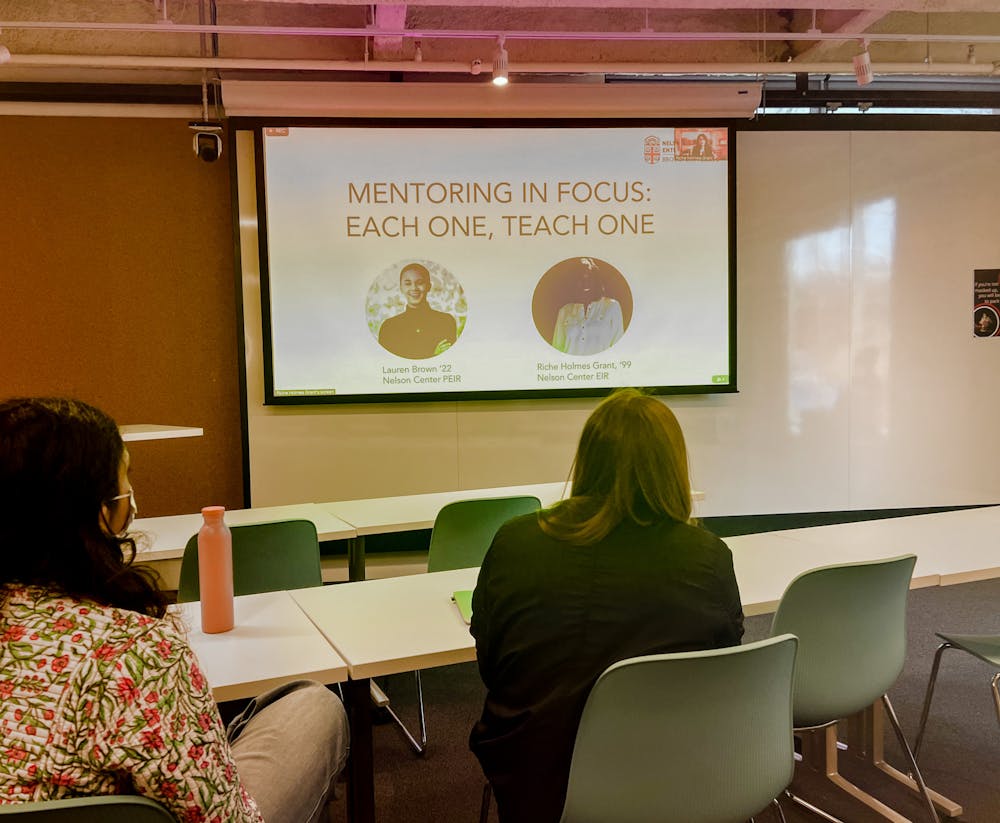The Nelson Center for Entrepreneurship hosted a discussion Thursday afternoon titled “Each One, Teach One,” which looked into the best practices for finding a mentor and cultivating a relationship with them at the University and beyond. The event, led by Riche Holmes Grant ’99, entrepreneur in residence and Lauren Brown ’22, lead peer entrepreneur in residence, was part of the Mentoring in Focus series, a four-part series hosted by the Center that began in Jan. 2021. Holmes Grant participated in the event through Zoom, while Brown spoke in person at the Center.
The title of the event, “Each One, Teach One,” stems from an African proverb, Holmes Grant said, that originated in the United States during the time of slavery, when Black Americans were denied education.
Throughout the session, Holmes Grant told several anecdotes about ways she found mentors or offered her mentorship to others, and provided advice for students seeking out their own mentors.
Holmes Grant started the event by telling the story of finding a prominent mentor for the baby apparel company she started as a new mother, BambiniWare.
As Holmes Grant worked on the venture, she said she was often compared to businesswoman Martha Stewart.
“After the tenth person (compared me to Stewart), I (decided) to step back and really (look) at how she builds her empire,” Holmes Grant said.
Holmes Grant found an event Stewart was holding at her headquarters in New York City with open attendance.
“I went and brought my baby accessories with me. I pulled (Stewart) aside and I said, ‘It’s so great to meet you and I love what you’re doing.’”
Stewart then proceeded to give Holmes Grant a business card and told her to reach out if Stewart could help her at all.
“So many times in my life, people have said that to me and I have not taken advantage,” Holmes Grant said. But that time, she got back into contact with Stewart and they became brand partners in BambiniWare.
Taking advantage of opportunities was one of the focus points of the presentation. Holmes Grant and Brown instructed students to utilize platforms such as LinkedIn, BrownConnect, Women’s Launch Pad and the Nelson Entrepreneurship Center.
Holmes Grant also encouraged students to stay in touch with professors and family members to take advantage of relevant connections that they might have for a mentor.
The pair also emphasized the importance of respecting the mentor’s time.
“Their time is very valuable. It shouldn’t be on the mentor to have to reach out (to the mentee),” Holmes Grant said.
Prior to meeting their mentor, Brown recommended that students also look them up on LinkedIn or Google to “get a feel for what sort of personal connections you may have.”
“Be careful in the beginning not to ask questions that are too personal and not to volunteer too much,” Brown said. “Just let (the relationship) grow.” Having realistic expectations of your mentor and trying “not to force” a match is also key to the success of a mentor-mentee relationship, both emphasized.
“Mentors are here to help you, but they’re not here to do your work for you,” Holmes Grant said.
Brown and Holmes Grant met at a pitch presentation when Brown was a participant in the Center’s Breakthrough Lab program her junior year, a program that assists students with their ventures.
“I thought she was really cool. I met with a lot of students that day (and Lauren) was obviously serious about her venture,” Holmes Grant said in the event.
Brown said she also thought Holmes Grant was “so cool” and was excited about being paired with her as a potential mentor.
The relationship between the pair grew “organically” as Holmes Grant helped Brown develop her venture and ultimately assisted with classes, plans for life after college and “just life in general,” Holmes Grant added.
Brown, who is concentrating in Business, Entrepreneurship and Organizations, began her venture, Figured, in her junior year. Figured offers customized natural hair care guidance to women with Afro-textured hair and offers products for caretaking from Black-owned businesses.
“I started off getting mentoring for my specific startup,” Brown said. “Once I paused work on (Figured), our relationship started to change and it started to become more about personal development.”
Brown said she learned “vision-boarding” from Holmes Grant — and she also likes that they are now able to “brainstorm and do events like this together.”
One audience member, Trisha Ballakur ‘22, is a CTO for startup app Pointz, which aims to provide scooter riders and bicyclists with “bike-friendly routing,” The Herald previously reported. For Ballakur, finding a mentor was “a little bit slower,” but ultimately successful. She attended the presentation to better understand what a productive mentor-mentee relationship looks like.
“Hearing (about) the relationship between (Holmes Grant) and (Brown) was super refreshing,” she said.
At the conclusion of the presentation, Holmes Grant also spoke about a new initiative that will be coming to the Nelson Center for Entrepreneurship this month that will connect Black students interested in entrepreneurship to Black mentors.
“The benefit of having a mentor is really the personal development side,” Holmes Grant said. “Learn their story, take advice along the way, because you can carry that for the rest of your life.”





